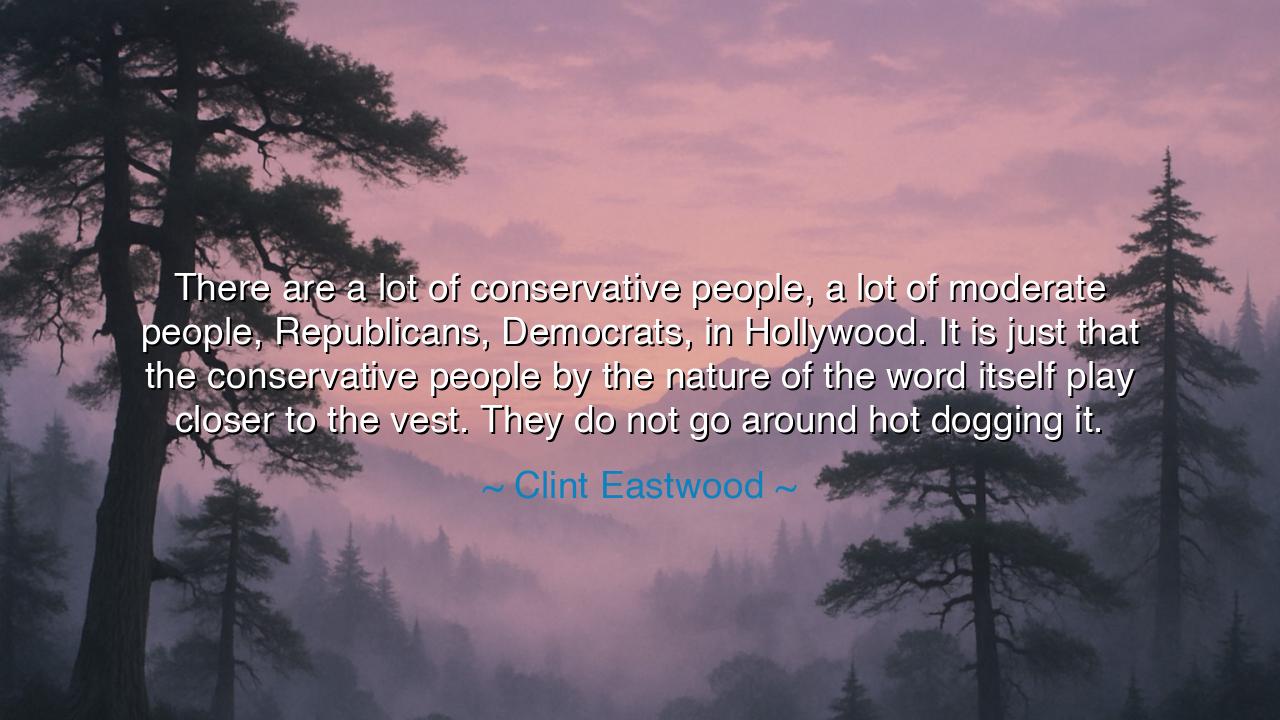
There are a lot of conservative people, a lot of moderate
There are a lot of conservative people, a lot of moderate people, Republicans, Democrats, in Hollywood. It is just that the conservative people by the nature of the word itself play closer to the vest. They do not go around hot dogging it.






Clint Eastwood, the man of few words and steely presence, once observed with candor: “There are a lot of conservative people, a lot of moderate people, Republicans, Democrats, in Hollywood. It is just that the conservative people by the nature of the word itself play closer to the vest. They do not go around hot dogging it.” In this reflection, he reveals not only the hidden diversity of thought in a place often portrayed as monolithic, but also a deeper truth about temperament, restraint, and the quiet strength of conviction. His words speak to the difference between those who proclaim loudly and those who act with guarded reserve.
The meaning of his words is rooted in the very essence of the term conservative. To conserve is to hold back, to preserve, to measure one’s steps with caution rather than leaping in haste. Eastwood, himself a figure of both art and grit, shows us that in Hollywood — a place of spectacle and constant self-promotion — there are indeed those whose nature is to remain reserved, closer to the vest, unwilling to brandish their beliefs like banners in the wind. They may be as numerous as the bold, but their silence and restraint make them less visible.
The origin of this truth lies not only in politics but in human nature itself. There have always been voices that shout and others that whisper. In the agora of Athens, philosophers like Diogenes made their point with dramatic stunts, while others like Plato taught with steadier dignity. In Rome, there were senators who thundered in the Forum and others who worked quietly behind the scenes. Both temperaments exist in every age, but those who are cautious often fade from view, while those who display themselves are remembered as the louder face of the times. Eastwood reminds us that silence does not mean absence, and restraint does not mean weakness.
History offers a vivid example in the life of George Washington. Surrounded by fiery revolutionaries who filled pamphlets and taverns with words, Washington was a man of few public statements. His power lay not in speeches but in presence, action, and a deliberate silence that made his voice weightier when he chose to speak. He played “close to the vest,” never “hot dogging it,” and for that reason he became the figure whom all sides could trust to lead. His reserve was not emptiness, but discipline.
Eastwood’s insight also points to the nature of Hollywood itself, a realm where self-display is often the coin of survival. Yet even here, there are those who resist the temptation to shout their every belief, who preserve a sense of privacy in an age of constant exposure. This choice, though quieter, is itself a form of power: the power to withhold, to speak when necessary, and to let actions define one’s character more than declarations. The conservative temperament, in Eastwood’s view, is not silence from fear but silence born of philosophy — a belief that not every thought must be paraded for applause.
The lesson for future generations is twofold: first, do not assume that the loudest voices represent the whole of a people. For in every community there are quiet ones whose convictions run deep, though they choose not to broadcast them. Second, learn the strength of restraint. Not every truth needs to be shouted, not every conviction displayed. Sometimes the greatest power is in waiting, listening, and speaking only when the moment is ripe. This was the way of sages, generals, and leaders who understood that words carry greater weight when rare.
Practical action must follow. Cultivate the ability to know when to speak and when to remain silent. In your workplace, in your community, and in your family, resist the temptation to “hot dog” — to boast, to parade, to clamor for attention. Instead, let your character be proven in deed, so that when you do speak, others will listen with respect. Seek balance: neither cowardice nor vanity, but the steady path of measured words and enduring action.
Thus, Eastwood’s reflection, though spoken of Hollywood, becomes timeless counsel for all. There will always be those who trumpet their beliefs, and those who guard them. Do not mistake quietness for absence, nor loudness for truth. Learn the art of living close to the vest when wisdom demands it, and in this way, you will walk with dignity through a world that too often mistakes noise for power. For true strength does not boast; it simply endures.






AAdministratorAdministrator
Welcome, honored guests. Please leave a comment, we will respond soon